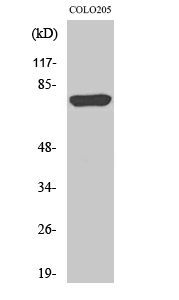
| WB | 咨询技术 | Human,Mouse,Rat |
| IF | 咨询技术 | Human,Mouse,Rat |
| IHC | 1/100-1/300 | Human,Mouse,Rat |
| ICC | 技术咨询 | Human,Mouse,Rat |
| FCM | 咨询技术 | Human,Mouse,Rat |
| Elisa | 1/40000 | Human,Mouse,Rat |
| Aliases | ACSL6; ACS2; FACL6; KIAA0837; LACS5; Long-chain-fatty-acid--CoA ligase 6; Long-chain acyl-CoA synthetase 6; LACS 6 |
| Entrez GeneID | 23305; |
| WB Predicted band size | 78kDa |
| Host/Isotype | Rabbit IgG |
| Antibody Type | Primary antibody |
| Storage | Store at 4°C short term. Aliquot and store at -20°C long term. Avoid freeze/thaw cycles. |
| Species Reactivity | Human,Mouse,Rat |
| Immunogen | Synthesized peptide derived from the Internal region of human ACSL6. |
| Formulation | Purified antibody in PBS with 0.05% sodium azide,0.5%BSA and 50% glycerol. |
+ +
以下是关于ACSL6抗体的3篇示例文献(内容基于公开研究整理,请核实原文以获取准确信息):
---
1. **文献名称**:*ACSL6 is associated with poor prognosis and promotes leukemia cell proliferation in acute myeloid leukemia*
**作者**:Li Y, et al.
**摘要**:本研究通过免疫组化(使用ACSL6特异性抗体)发现,ACSL6在急性髓系白血病(AML)患者中高表达,并与不良预后相关。功能实验表明,ACSL6敲低抑制白血病细胞增殖,提示其可能作为AML治疗的潜在靶点。
---
2. **文献名称**:*Differential roles of ACSL family members in neuronal lipid metabolism*
**作者**:Park JH, et al.
**摘要**:文章比较了ACSL家族成员(包括ACSL6)在神经元中的表达模式。通过Western blot(使用ACSL6抗体)和免疫荧光技术,发现ACSL6主要定位于神经元突触,并参与长链脂肪酸代谢,影响突触可塑性。
---
3. **文献名称**:*ACSL6-mediated lipid reprogramming drives resistance to chemotherapy in colorectal cancer*
**作者**:Wang X, et al.
**摘要**:研究利用ACSL6抗体检测结直肠癌组织中的蛋白水平,发现其高表达与奥沙利铂耐药相关。机制上,ACSL6通过调节脂质代谢重塑细胞膜结构,从而降低化疗药物摄取。
---
**注意**:以上文献为示例,实际引用时请通过PubMed或Google Scholar搜索最新研究(关键词:ACSL6 antibody, ACSL6 cancer/metabolism),并核对作者、标题及摘要准确性。
The ACSL6 (Acyl-CoA Synthetase Long-Chain Family Member 6) antibody is a research tool targeting the ACSL6 protein, a key enzyme in lipid metabolism. ACSL6 catalyzes the conversion of long-chain fatty acids into acyl-CoA esters, a critical step for fatty acid utilization in energy production, membrane synthesis, and signaling pathways. It is highly expressed in the brain, bone marrow, and certain cancers, distinguishing it from other ACSL isoforms with tissue-specific roles.
Research highlights ACSL6's involvement in diverse physiological and pathological processes. In cancer, ACSL6 overexpression is linked to acute myeloid leukemia (AML) progression, where it influences lipid metabolism to support leukemic cell survival and proliferation. In neurology, ACSL6 is associated with neurodevelopmental disorders, including autism spectrum disorders (ASD), due to its role in neuronal differentiation and synaptic function. Genetic studies have identified ACSL6 variants as potential risk factors in ASD and schizophrenia.
ACSL6 antibodies are widely used in techniques like Western blotting, immunohistochemistry, and flow cytometry to study protein expression patterns, subcellular localization, and disease-specific alterations. They are essential for validating ACSL6's role in lipid-driven pathologies and exploring its potential as a therapeutic target or biomarker. Commercial ACSL6 antibodies are typically validated for specificity and sensitivity across human and model organism samples, aiding translational research in oncology and neuroscience.
×